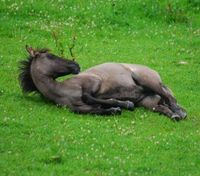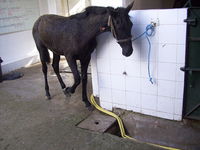Difference between revisions of "Colic Diagnosis - Clinical Signs"
Jump to navigation
Jump to search
| (13 intermediate revisions by 2 users not shown) | |||
| Line 1: | Line 1: | ||
| + | {{review}} | ||
| + | |||
==Clinical signs== | ==Clinical signs== | ||
| + | |||
| + | [[File:Rolling horse logo.jpg|thumb|200px|right| Picture of rolling horse (Courtesy of Lily M, WikiMedia Commons)]] | ||
| + | |||
| + | [[File:Pawing horse.jpg|thumb|200px|right| Picture of horse sweating up and pawing the ground(Courtesy of Potter K, SPANA)]] | ||
| + | |||
It is important for the owner or trainer of horses to be able to recognise the clinical signs of colic. This will enable the veterinarian to be contacted as soon as possible to give the horse the best chance of survival. | It is important for the owner or trainer of horses to be able to recognise the clinical signs of colic. This will enable the veterinarian to be contacted as soon as possible to give the horse the best chance of survival. | ||
| Line 23: | Line 30: | ||
*Excess salivation | *Excess salivation | ||
*Decreased faecal output | *Decreased faecal output | ||
| − | *Increased pulse rate and respiratory | + | *Increased pulse rate and respiratory (see normal values [[Equine Physiology - WikiNormals|here]]) |
*Congested mucous membranes | *Congested mucous membranes | ||
| + | |||
| + | ==References== | ||
| + | * Meuller E, Moore J. N, (2008) Classification and Pathophysiology of Colic, Gastrointestinal Emergencies and Other Causes of Colic, in Equine Emergencies- Treatments and Procedures, 3rd Edition, Eds Orsini J. A, Divers T.J, Saunders Elsevier, pp 108 | ||
| + | |||
| + | |||
| + | [[Category:Colic_Diagnosis_in_the_Horse|B]] | ||
Latest revision as of 15:33, 23 July 2010
| This article has been peer reviewed but is awaiting expert review. If you would like to help with this, please see more information about expert reviewing. |
Clinical signs
It is important for the owner or trainer of horses to be able to recognise the clinical signs of colic. This will enable the veterinarian to be contacted as soon as possible to give the horse the best chance of survival.
Signs of Abdominal Pain in order of Increasing Severity
- Repeated lying down and rising
- Inappetence
- Quivering of the upper lip
- Flank watching
- Frequent attempts to urinate
- Kicking the abdomen with hind feet
- Crouching as if trying to lie down
- Sweating
- Dropping to the floor and rolling violently
Other Clinical Signs
- Pawing and/or scraping
- Stretching
- Pacing
- Repeated flehmen response
- Rolling
- Groaning
- Bruxism
- Excess salivation
- Decreased faecal output
- Increased pulse rate and respiratory (see normal values here)
- Congested mucous membranes
References
- Meuller E, Moore J. N, (2008) Classification and Pathophysiology of Colic, Gastrointestinal Emergencies and Other Causes of Colic, in Equine Emergencies- Treatments and Procedures, 3rd Edition, Eds Orsini J. A, Divers T.J, Saunders Elsevier, pp 108

